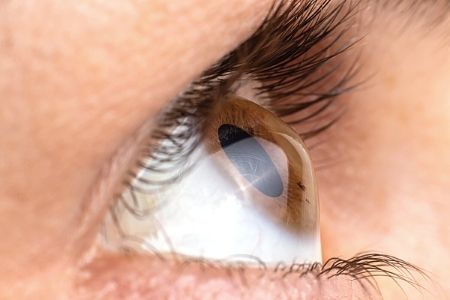LASIK surgery can help a wide variety of vision problems, but there are some health conditions that might disqualify a person from receiving this form of laser eye surgery.
A LASIK eye surgeon is the best person to determine whether you and your eyes are eligible for the procedure, but here are a few of the health issues that might be disqualifying factors in undergoing laser eye surgery.
Keratoconus May Prevent You From Having LASIK

One medical condition that might mitigate against LASIK eye surgery is an eye disorder called keratoconus. This is a degenerative disease that causes the cornea of the eye to thin out and become cone-shaped.
This condition can predictably cause a disturbance in the patient’s vision. Some of the symptoms can be blurry vision, seeing multiple images, distortion of objects, difficulty seeing fine details, and often very sensitive to light. However, early on Keratoconus can by totally asymptomatic.
Keratoconus is usually suspected in those who show increasing astigmatism and a topographical image of the cornea can reveal the typical irregular shape. The condition is commonly discovered when the patient is a teenager and can gradually worsen throughout their young adulthood. Eye rubbing is a known risk factor for inducing this condition and causing it to progress. It can also run in families and therefore knowing about a family history of Keratoconus is helpful when someone is considering laser refractive surgery such as LASIK or PRK. A topography is done for all of our patients prior to LASIK at Berkeley Eye Center to screen for this condition.
Fortunately, glasses are often enough to correct the patient’s vision, but if the condition worsens they might need Rigid Gas Permeable (RGP) or scleral contact lenses to achieve better vision. Typically, LASIK surgery, where the cornea of the eye is sculpted by a beam of laser light, is contraindicated in patients with Keratoconus.
Other Eye Conditions May Cause Issues with LASIK
Another medical condition that might preclude the use of laser eye surgery is severe dry eye, whose medical name is keratoconjunctivitis sicca. Dry eye is caused either by the person not producing enough tears or the tears quickly evaporating. It is a very common condition, but the most severe cases can be a contraindication for LASIK surgery because it can potentially exacerbate the condition.
Severe dry eye patients can feel their eyes to be extremely dry, burning, irritated, and/or painful. Sometimes dry eye can lead to minuscule abrasions on the eyes. Thankfully, there are many treatment options for dry eyes, and most patients who have dry eyes are still candidates for laser vision correction.
Some people suffer from an extreme form of nearsightedness or myopia that also would prevent them from undergoing LASIK. This form of myopia is so severe that the amount of sculpting of the cornea by the laser would be too much. Thankfully, there are other options available for patients with extreme myopia. At Berkeley Eye Center, we offer the Evo ICL, which can be an excellent option for those who are not candidates for LASIK.
Injuries, Diabetes and Glaucoma
Some patients have experienced trauma or complications in the past that resulted in scarring or other conditions of the eye which may preclude LASIK. A thorough examination would be needed to fully evaluate someone with a history of eye trauma or scarring to see if they were a candidate for LASIK.
People who have weakened immune systems may not be a candidate for laser eye surgery due to the concern of healing issues postoperatively. There are dozens of autoimmune diseases, including lupus, psoriasis, rheumatoid arthritis, multiple sclerosis and Sjøgren’s syndrome. Scleritis and uveitis, which are specific types of inflammation of the eye, can be a first sign of an autoimmune disease. Any of these conditions could disqualify a person from getting LASIK surgery.
People with uncontrolled diabetes also may not be candidates for laser eye surgery. Not only can diabetes make it more difficult for a person to heal from surgery, but eye problems are a complication of uncontrolled diabetes. Abnormal blood vessels called neovascularization can occur on the inside of the eye and can grow weak and cause bleeding. A comprehensive eye exam is needed to rule out diabetic eye disease as it can be asymptomatic to patients early on.
People with glaucoma may be ineligible for LASIK surgery as well. Before the procedure, the pressure of the eye will be measured to confirm that it is in the normal range. If the intraocular pressure is elevated and uncontrolled, it will need to be treated prior to consideration of LASIK.
Schedule a Free LASIK Consultation
If you’re interested in laser vision correction but suffer from a health condition, we recommend talking to the experienced LASIK doctors at Berkeley Eye Center to find out if you are a candidate. Your doctor will be able to best determine whether you are a candidate for LASIK or whether any existing health conditions preclude you from having laser eye surgery.
Call (713)-526-1600 today or click here to schedule a free LASIK consultation.
